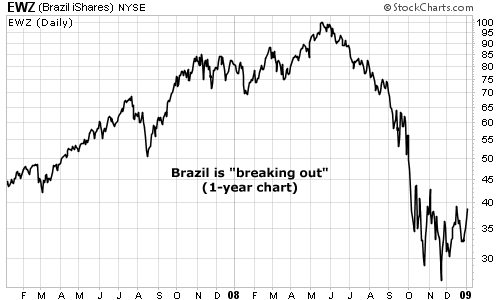By Dr. Steve Sjuggerud | 6 January 2009
When emerging markets get going, they can go nuts. I think 2009 could be one of those "nuts" years for emerging-market stocks. When I started my career in 1993, I specialized in international stocks, particularly Asian stocks.
The "king" back then was a guy named Mark Mobius. He ran the Templeton Emerging Markets Fund (he still does) [[not for retail customers: normxxx]]. Check out some of the returns on Mobius' fund over the years:
|
Mobius just about doubled investors' money in four different years. In three of the four years before Mobius doubled his investors' money, his fund lost value. Last year was the fund's worst year ever… It lost over half its value. Emerging-market stocks in general lost more than 50% last year. Now they're cheaper than ever.
Importantly, they're cheaper today than they were before each of those near-triple-digit runs above. When emerging-market stocks get cheap, they get really, really cheap— they're usually on the brink of disaster. They've borrowed too much [[and often in 'hard' currencies, which amplifies their debt: normxxx]] and then they have a massive currency crisis. But right now, emerging-market countries are in surprisingly good shape.
To show how cheap emerging markets are, and how much money you can make, take a look at this table of Hong Kong stocks I published in a recent issue of True Wealth: 12 months after Hong Kong bottoms[!?!], stocks gain an average 74%!
| ||||||||||||||||||||||||||||||||||||||||||||||||||
As you can see, in late 2008, Hong Kong stocks got as cheap as they've been in the last 25 years. Back in 1984, Hong Kong stocks were cheaper… and they rose over 100% in just 12 months. At these levels, investors in this market have always made money. It's time to get exposure to emerging-market stocks, if you don't already have it. Investors have doubled their money when the time was right.
It's happened before… and we have the conditions right now for it to happen again.
.
The Emerging-Market Trade Is Breaking Out
By Brian Hunt | 14 March 2009
Another note on the "long emerging markets" argument… we're seeing breakouts all over the place. A "breakout" is a simple tool you can use to make a fortune trading stocks, currencies, and commodities. It's when an investment's price action changes course and goes from terrible to good… and it's often a great signal to buy a beaten-down asset. Let's take a look at the past year in the Brazilian ETF (EWZ) to see what one looks like.
Brazil is loaded with rich farmland, fresh water, iron mines, and oil deposits… so its stock market moves up and down with the price of commodities. It's also a speculative emerging market, so it got crushed last fall. It fell from $100 a share to $30 in just five months.
But as you can see from today's chart, Brazil is breaking out of the trading range it's been in since October. The selling pressure is exhausted. Shares are moving back up as buyers return to the market. It's not just Brazil… most emerging markets are behaving the same. This rebound trade is looking good!

Vanguard Emerging Markets Stock ETF (VWO)— 5 Years
Vanguard Emerging Markets Stock ETF (VWO)— 6 Months
ߧ
Normxxx
______________
The contents of any third-party letters/reports above do not necessarily reflect the opinions or viewpoint of normxxx. They are provided for informational/educational purposes only.
The content of any message or post by normxxx anywhere on this site is not to be construed as constituting market or investment advice. Such is intended for educational purposes only. Individuals should always consult with their own advisors for specific investment advice.
No comments:
Post a Comment